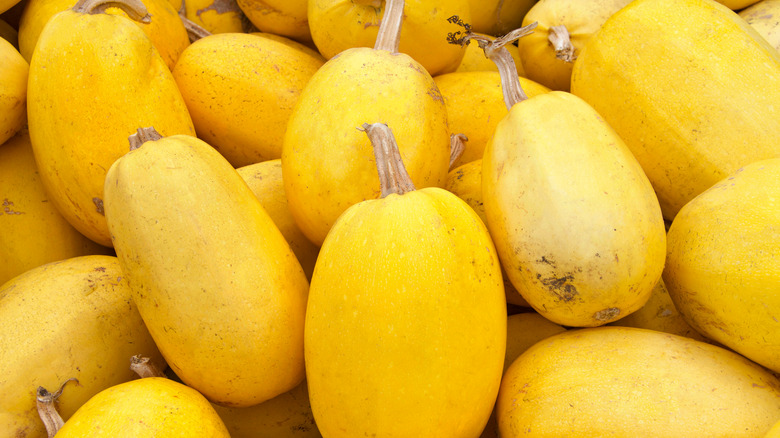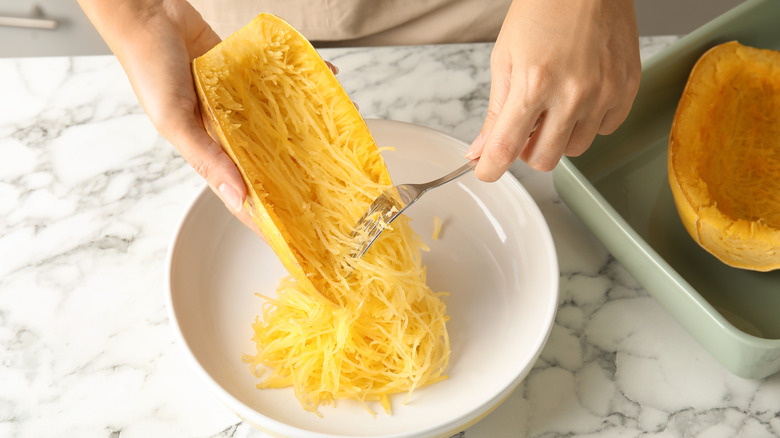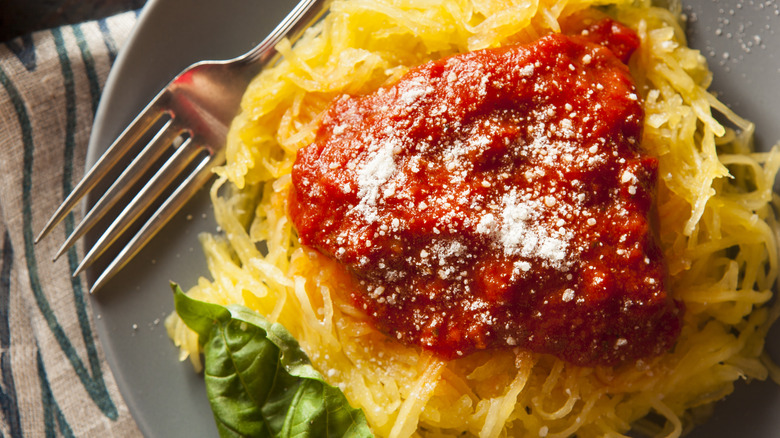How To Freeze Spaghetti Squash So It Doesn't Lose That Signature Texture
Spaghetti squash is a popular vegetable and for good reason. It's very versatile, as it can be used as a pasta substitute, as a side vegetable, and as an ingredient in soups or other one-pot meals. In addition, it keeps for weeks or months when stored correctly. However, what if you want your spaghetti squash to keep even longer? It's all too easy to go overboard and buy a few too many of this large vegetable during the fall months, and the rest of the year, it can be harder to come by.
Spaghetti squash can be pre-cooked and frozen to extend its shelf life or to save time while cooking, but the most difficult aspect of doing so is keeping its texture. No one wants to thaw this vegetable only to find it mushy and waterlogged. To retain the texture of the squash, simply drain the cooked strands to get rid of excess moisture. It's an important step that you'll be grateful you thought of come thawing time.
Drain spaghetti squash to preserve its texture
The first step in freezing spaghetti squash is to cook it. You can easily do this by halving the squash (there's a handy cutting hack if you're struggling), removing the seeds, and placing it on a baking sheet. Then, roast it in the oven at 350 to 375 degrees Fahrenheit until the strands separate easily with a fork, or at least 40 minutes. After removing it from the oven, allow it to cool before using a fork to remove the strands.
To prevent the squash from becoming soggy during the freezing and thawing process, you can put the strands in a colander in the refrigerator, using a bowl to catch the liquid. After letting it sit for half a day (or overnight), it is ready to be frozen. Separate it into desired portions and place it in the freezer. The squash can be thawed in the refrigerator for 12 hours or even placed directly into a soup or sauce to heat while cooking.
As an additional step to protect the texture of the strands, flatten the portions in each container before placing them in the freezer, and place them far enough apart to allow air to circulate between them. This speeds up the freezing process and prevents large ice crystals from forming, which would damage the texture of the food. This additional step will help your strands thaw as intended without turning to mush.
Benefits of freezing spaghetti squash
Freezing spaghetti squash this way will allow you to store it for longer than it would keep in your pantry. Once frozen, the squash will last up to one year. This will allow you to maximize your fall farmers market trips or farm share boxes without wasting money or food. In addition, it can help you save money by buying produce while it's in season.
In addition, freezing spaghetti squash is a good way to meal prep. Although roasted spaghetti squash is a cinch to make, it takes quite a while to cook. Cooking and freezing your squash in advance is a great way to save time. In addition, it's easy to keep some on hand so you have a vegetable ready to add to a meal or just want to make your favorite spaghetti squash recipe.
Having spaghetti squash that you can deploy at will should open up a world of culinary possibilities. So the next time you find yourself with more squash than you can eat, or if you're just planning ahead, try this method to preserve it for months without sacrificing its texture.


